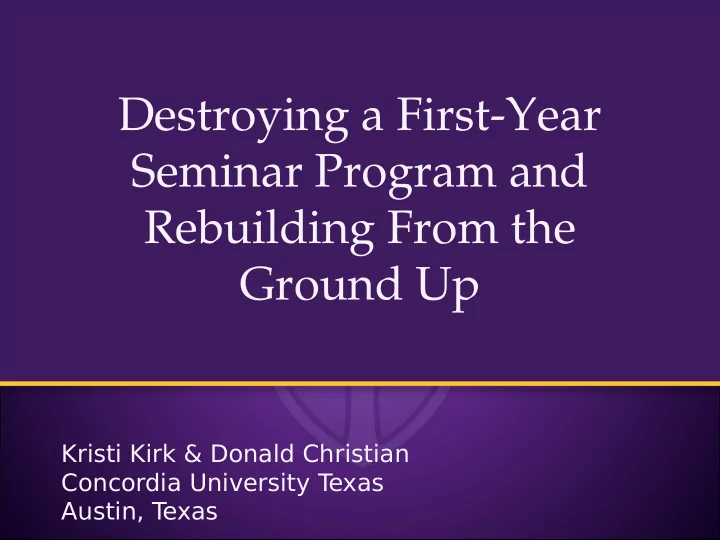

Destroying a First-Year Seminar Program and Rebuilding From the Ground Up Kristi Kirk & Donald Christian Concordia University T exas Austin, T exas
The history of freshman seminar at CTX … B A D
From Bad to Worse: History of Freshman Seminar at CTX • Mid 80s – 2000 – The Master Student • Fall 2000 to Fall 2004 – ORI 1101 Freshman Seminar • Fall 2005 – The Disaster Year • Fall 2006 – No requirement for all students – Developing Scholars Seminar for provisional students • Fall 2007 – Life and Leadership
Student opinions … • From Fall 2005 course assessments – “I did not fjnd this course to be useful.” – “They (large groups) are a waste of time.” – “Freshman Seminar shouldn’t meet so often.” – “If you want students [to be] successful, make the class something students want to go to instead of something they dread.” – “Get rid of Freshman Seminar.” “Do away with it.”
Why we failed • No ownership/champion – Or the wrong one • Struggle between academics and student services • Trying to “be all things to all people”
Why we failed • No goals/direction – Cohorting by majors – Separating provisional students – Service learning – Academic or social? • No collaboration • Model that wasn’t workable
R.I.P.
Developing a new course • Receiving approval from faculty • Organizing an exploratory committee • Creating the syllabus – Major purpose – Outcomes – Course setup – Expectations/Logistics
Developing a new course • Vetted syllabus through committee • Looked at other schools/best practices • Issues to tackle – Who could teach/who would teach? – What to include/What not to include? – T oo much/T oo little? – Academic content/Student services content? – Common course calendar & activities?
IT PASSED! • First week of October – faculty says “go ahead” (skepticism reigns) • First week of November – fjrst stab at developing syllabus (confusion reigns) • First week of December – syllabus fjnalized (uneasiness reigns) • Second week of January – faculty approves Life & Leadership syllabus (rejoicing reigns)
Why We Succeeded • We were willing to “kill” it • We found a champion • We waited for the right time • We developed a good model • We involved the right people • We didn’t involve the wrong people • We ignored/navigated roadblocks
Selecting (the right) Instructors • Committed to students • Can work in a team setting • Willing to be trained/developed • Can spend time spring and summer • Hand-picked • Developed written job description • 2-credits of pay for a 1-credit class • Handed out agreement to be signed
Instructor Input • Weekly meetings through April • Developing learning outcomes/course purposes • The BIG THREE (from 50+) • 10 specifjc learning outcomes
Instructor Training • “Best practices” readings – My Freshman Year • Group dialogues • Practicing team building • Vetted each other’s course handouts • Individuals developed activities and assessments for each outcome • Trained in Campus Tool Kit
Launching Life & Leadership • Met as classes twice during Week of Welcome • Paired instructors (2 in each time slot) • Kept meeting as instructors throughout fall semester • Partnered with Service Learning
Launching Life & Leadership • T wo Special Events: – All student chapel – Speaker from Growing Leaders • Developed Pre-T est/Post-T est for learning outcomes • Use of Instructor Assessments of course • Provided regular updates to full faculty • Provided funds for outings/donuts/etc
Ongoing Improvements • Year 2 – Minimal changes • Added optional extra seminars – Ongoing development • Millenials Go to College – Addressed things directly observed through assessment • Added Lutheran Ethos piece to Week of Welcome • Provided “life success seminars” as options • Chose not to bring in Growing Leaders speaker • Met more frequently during Week of Welcome
Ongoing Improvements • Year 3 – Went to 2 days a week • Monday – large group seminars • Wednesday – small group discussions – Dropped Campus Tool Kit – Added Strengths Quest – Added a Common Book/Reading – Deepened the First Year Experience • Servant Event during Week of Welcome • Added T eaching Freshmen Workshops
What’s Next? - Building a true FYE • Mid-semester service project • 2 nd Semester class/connections • Learning Communities • Use of student mentors • Enhancing the Monday Seminar • Strengths Quest training and deeper implementation • Mid-semester grade checks
Life & Leadership – A Wrap-Up • What we saw… • What we did… • What we learned… • What we changed… • What we want to do…
Want more info? Kristi Kirk, Associate Provost Kristi.Kirk@Concordia.edu Donald Christian, Dean College of Business Donald.Christian@Concordia.edu
Recommend
More recommend